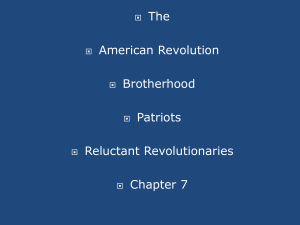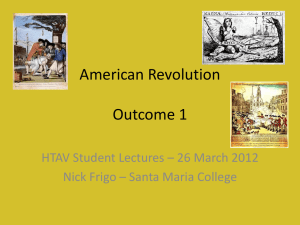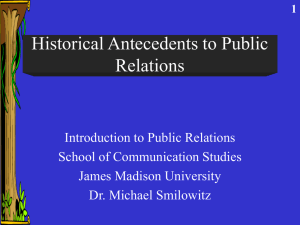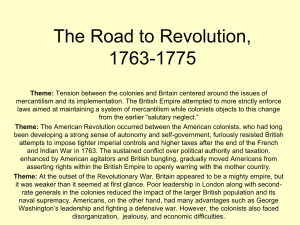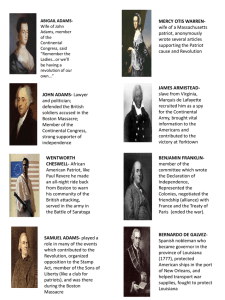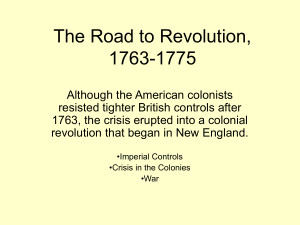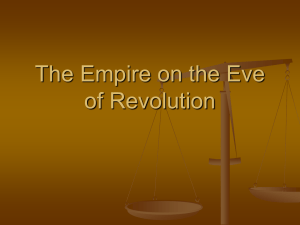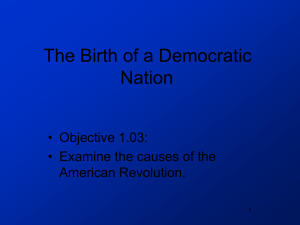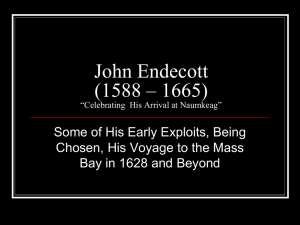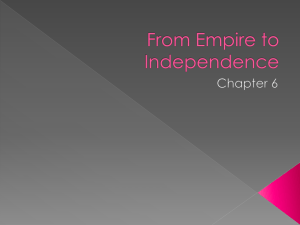The American Revolution
advertisement
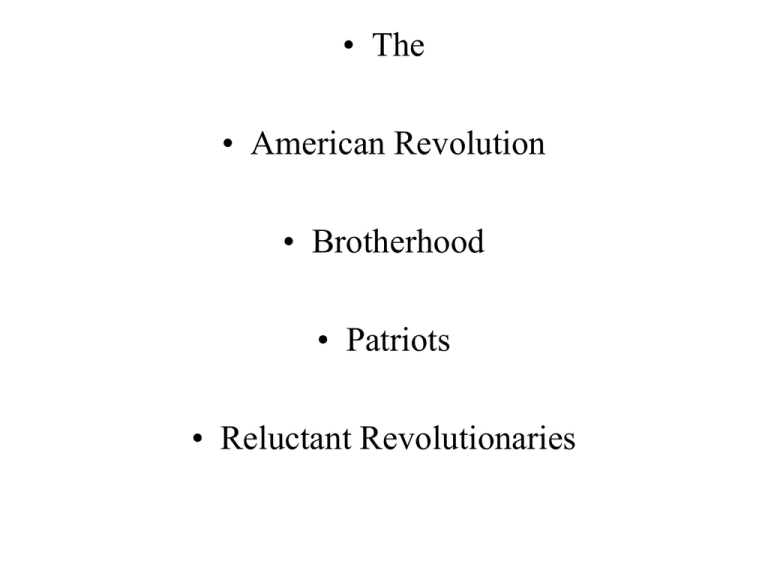
• The • American Revolution • Brotherhood • Patriots • Reluctant Revolutionaries • Americans are amazingly inconsiderate toward their own history; We know more than we credit ourselves, but we fail to understand how unlikely, extremely paradoxical the event was; • We recognized Valley Forge and comprehend the suffering of the Continental Army – but who were these soldiers? • Why is it that the Americans fought better and more efficiently behind rocks and trees, but yet, in the end aped a European Army in style and tactics? • Who really defeated the British, the Minutemen Militia units, the Continental Army, or the French? • And, ultimately why was the British eventually defeated in the Caribbean and not in America? • Why do we praise the virtues of citizens soldiers, yet, Washington cursed them as a rabble of misfits, scum, and Mutineers? • Was the revolution radical or conservative? Was it successful – why did it not go the way of the French Revolution? • Emeritus Historian Edmund S. Morgan stated, • “no one has ever quite understood the Revolution and no one truly will.” • Story of Eldridge Gerry and Benjamin Harrison— explains the perspicacity of the unfolding events. • They knew they were laying the foundation for “Millions, Yet, unborn.” • The brotherhood itself consisted of the usual suspects: • George Washington, Benjamin Franklin, John Adams, James Madison, Thomas Paine, Alexander Hamilton and a coterie of leading politicians and social leaders. • Real star of the Revolution is the revolution itself—we must not overlook the event—it is as important as the people—People give a face to the Revolution. • Achievements: English Philosopher Alfred Lord Whitehead compared the legacy of the American Revolutionaries to the rule of Caesar Augustus in Rome. • Everyone was aware of how important this event truly was – maybe the British more than the Americans – Certainly the Americans understood the moment. • Achievements: • 1) First successful war for colonial independence; • 2) First enduring largescale Republic; • 3) First nation designed on a “Liberal Recipe” in terms of political and economic character. • This new Nation combined in latent form two seminal and seemingly contradictory ideas— • Democracy and Capitalism, along with a radical concept of Popular Sovereignty --• Common Ordinary People could Govern themselves, Tax themselves, Secure their own blessings of Liberty w/o a King or Monarchy • Divinity lay with the People, not a title or family lineage. • The American Revolution, in and of itself was very different from previous revolutions and many that followed— • There were no Guillotines, or major bloodletting—simply it did not devour its own. • It was a collective achievement that eschewed a monarchy or divine figurehead—instead opting for a seminally democratic system of checks and balances—that derived its authority from the consent of the governed. • The revolutionaries, rather than choosing to kill one another chose to argue with one another— • Yes, historians do point out the failures of the Revolution—ie it did not end patriarchy (deferring to one’s betters), nor racism, nor did it bring about absolute equality – • However, it did give us a vehicle, a political mechanism that would eventually lead to these things—’Founding Fathers’ were also a product of their time, as we are a product of our time. • The bigger question is how did such a sparsely populated area produce such an impressive crop of leaders and political elite? • America very isolated outpost on the fringes of wilderness and 3000 miles away from cultured civilization; • The Scottish enlightenment, the Age of Reason, the Reformation and Liberal idealism were ideologies available to the Americans. • Uniquely the 13 colonies formed a postAristocratic and Pre-Democratic society—this offered unprecedented opportunities for those with talent; • The ‘Founding Fathers’ were very aware that they were present at the Creation – • They knew they were destined for greatness or the hangman. • Imperial reforms of 1763 • Why a Revolution and Not Simply • A Political Evolution? • George III assumed the Throne as a 21 yr old -he was determined to be King, not as his father and grandfather, who did not speak English and ignored the political processes; • Imposed Imperial Reform throughout the British Empire – the War had been costly. • King George assumed these minor reforms were necessary– He lowered the rates to avoid contention – • He enforced the Proclamation of 1763, enforced the Navigation Acts, and enacted what would become the Declaratory Act; • Unfortunately, Britain had essentially used “benign Neglect” toward the colonies for over 100yrs. • Proclamation of 1763: • Effectively closed off all westward migration west of the Alleghany Mountains; • Americans felt hemmed in, corralled—easier for the British to control and eventually enslave them; • Early, Colonists were puzzled—why all this concern for the colonies? • Colonists had instituted their own legislatures, their own churches, social groups and colonial militias—they seemed to be doing fine without British intervention; • British stated precedent: Navigation Acts of 1660, The Wool Act of 1699, Molasses Act 1733 etc … Just needed to be better enforcement • Americans didn’t grumble much—Smuggling could get around the navigation and Tax duties— • This time (1763) the British put teeth into it—after 100 years many of the colonial legislatures had wrangled some leverage in controlling local taxes and having some say in the Governor’s pay; • Also in how salvage and captures were to be disbursed – depending in whose territorial waters it took place. • The French and Indian War had literally left the British economy on the verge of bankruptcy; • They had an empire but were essentially broke; • Passed minor legislation to offset the cost to the British taxpayer – • George Grenville ushered through a Stamp Tax in 1765 – sent a preliminary document to the British Colonists … • The Stamp Tax required all legal documents, newspapers, college diplomas, playing cards, and all other print trade objects to pay a revenue; • The colonies went berserk -- they had been taxing themselves and felt the local legislatures were the only true form or voice they had in political matters; • Parliament was too far removed and did not understand the political, social or economic situation in America. • Colonial Mobs threatened Stamp Tax agents, burned tax agents in effigy, tar and feathered anyone who tried to collect the duty; • Coerced tax Agents to resign and tore down their houses if they refused; • Formed clubs of the Loyal Nine or the Sons of Liberty; convened their own Stamp Act congress to repeal the stamp; forced merchants to participate in boycotting British goods. • Pamphlets criticizing British policy widely disseminated; tracts and broadsides such as Daniel Dulaney’s “Considerations on the Propriety of Imposing Taxes” (1765), John Dickinsons (1765) “Letters from a Pennsylvania Farmer” and James Otis tracts first coining the phrase “Taxation without representation.” (1764). • Otis stated that this idea went all the way back to the Magna Carta that had instilled the notion of Parliamentary Law. • Parliament got the message—repealed the Stamp Act; unfortunately to assert their political authority They passed the Declaratory Act; • Gives the Parliament the right in all measures to enact legislation on Britain and British subjects; • It also suggested to the Americans they were not equal British subjects, but colonial settlements, somehow beneath true Britishness– could not have equal political rights or self-government. • Somewhat of a cooling off period—but in 1767 the Townshend Duties were passed; • It imposed a scheme of taxes on all colonial economies—but mostly imported duties; • After all Franklin, as a colonial agent in England stated that it was interference in internal taxes the Americans resented—not external duties; • This tax included lead, paint, glass, etc … external duties – ‘Champagne Charley’ very bright, hated the colonials—died leaving no direction in the Exchequer. • This time the Admiralty Courts, smuggling etc would also be dealt with—no trial by Jury – elimination of very basic rights of English Common Law; • Boston and other Ports contended and rioted and demonstrated; • British sent in troops to quell the volatility of the situation– soldiers do not make good diplomats or Police Officers. • Why Boston” Why was Boston so cantankerous? • Port city, duties effected it greatly—economic recession going on—very little jobs; • Bostonians were natural dissenters; Mostly blue collar, merchants, mechanics, and shop owners; • Believed in the Town Hall mentality—had left Britain because of British atrocities and corruption Believed what happened in Scotland and Ireland was a prelude to what the British intended to do in America. • Boston smart enough to realize they could not go it alone—Samuel Adams was the leader and main instigator—but always within the framework of the law; • Adams other than James Otis may have been the first person to desire and scheme for independence; • He wrote a ‘Circular Letter’ garnering a collective agreement among the colonies– stand firm and support Boston and the Boycott. • Set tone for Boston Massacre: • March 5, 1770, the 29th Regiment opened fire on a Boston crowd that had attacked them with snowballs and stones and ice balls and chunks of firewood; Five (5) Americans were killed. • Crispus Attucks was the first killed; Britain enacted the Boston Port Act closing the Port; initiating martial law, and bringing troops into the city to subdue – made Boston untenable … • John Adams took up the successful defense of the Troops that fired on the Boston Crowd; “Motley rabble of Irish Teagues, Jack Tars, Mulattos, and saucy Boys” • In 1764 he took up the American cause; • Wrote tracts espousing conspiracy theories concerning British commercial and tax laws; • Motive to prove this cause would be conservative and within the parameters of civilized law. • Abigail Quincy Adams; Married John in 1764— had 10 children; while John was in Congress she managed the farm and the estate—took care of real estate issues and legal matters; • Wrote prodigiously to John—traveled to Europe with John—Abigail was more than a wife—she also advised him on business, political, and social affairs • Antagonisms between Troops and Citizens became more violent and open—the Rope Works fight, the burning the of the Liberty Pole; escalated troubles for Guy Fawkes Day—where South end and North end Bostonians turned their celebrated antagonisms away from each other onto the Red Coats. • Parliament rescinded the offensive taxes except on Tea—the idea was to help out the East India Tea Company—lower the tax—almost a nominal charge – seemed coercive to colonists. • December 16, 1773, Liberty Boys dressed as Mohawks boarded the Ship in Boston harbor; • Hutchinson had decided the mob was not going to rule Boston—ordered the Tea unloaded and the tax collected—though he thought it crazy; • Dumped 342 chests of tea—Gesture Politics • (Quiet docile act) • George Washington— tends to be more in our wallets than our Hearts; • Still very much revered in American History; • Became viewed as the “First in War, First in Peace, and first in the hearts of his countrymen.” • Washington born in 1732—fourth generation American—doted on by his mother; • Always wanted to be an Officer in the British Army—he was a man of action and also sought fame and fortune and desired to be a Great Planter. • He decided to throw in with the Americans for very different reasons than did Adams—who deplored an aristocratic society and privilege at the expense of the lower classes—Adams was 14th in his class at Harvard for a reason. • To be a successful planter and live the life of the English Gentry he needed somehow to escape the debt and bankruptcy of the British mercantile system; indebted and enslaved to the system. • His western lands heavily invested in during the French and Indian Wars was given to the British or returned to the Indians—honor the Treaty and Proclamation of 1763. • He argued early that speech alone was insufficient—action and military action was needed to get the point across to the British. • Thomas Paine wrote “Common Sense” • Paine a ne’er do well left Britain for America with nothing but a letter of introduction from Benjamin Franklin. • Maybe the single most important piece of journalism in American History. • Openly blamed King George for incompetence and stated that an Island cannot rule a continent.” Sold 100,000 copies 1yr. • Common Sense • “These are the times that try men’s souls. The summer soldier and the sunshine Patriot will, in this crisis, shrink from the service of their country; but he who stands by it now, deserves the love and thanks of man and woman. • “Tyranny like hell, is not easily conquered; yet, … the harder the conflict the more glorious the triumph … it would be strange indeed if so celestial an article as Freedom should not be highly rated …” • Prelude to Revolution • 1754-1763 French and Indian War • 1762—Writs of Assistance Proclamation of 1763 inhibiting westward expansion 1765—Stamp Tax—relatively light tax 1767—Townshend Acts—duties on external goods and suspended New York Legislator until it agreed to authorize the Quartering of troops 1768—tension in Boston escalate until Britain enforces martial law and closes the Port 1770 March 5—Boston Massacre 1773—Tea Act—Boston Tea Party 1774 Quebec Act and the Coercive Acts—instilled permanent martial law and Port closure in Boston • Quebec Act of 1774 expanded the borders of Quebec down to the Ohio River confiscating land belonging to several colonies charted in their original charters— • It also recognized Religious toleration—They were Catholic …appointed a Royal Government… • Coercive Acts—Boston Port Act; Massachusetts Government Act, Administration of Justice Act (Admiralty Courts and any royal administrator killing a colonist would be tried in London), and the Quartering Act of 1774. • 1st Continental Congress Sep 1774 in response to the Intolerable Acts(Coercive Acts); • Endorsed the Suffolk Resolves, adopted the Declaration of the rights and grievances, agreed to establish a continental association; • Suffolk Resolves– strongly worded resolutions denouncing the coercive acts as unconstitutional— called for the colonial militia’s to arm and utilize economic sanctions against Great Britain • (Suffolk County—includes Boston) • Feb 1775—more moderate Parliament is elected and offers a Conciliatory Proposition Parliament would allow colonies to assume their own tax rate if it is satisfactory and reasonable. • Too little too late – Americans Samuel Adams and few others are ready for a fight—they want and desire independence – not reconciliation – • April 1775 – they get their wish in small little Hamlet called Lexington and Concord. Shot Heard Around the World • Because of Gesture Politics and other tensions in Boston, Thomas Gage is charged with keeping the peace. • He requests 20,000 troops. He is charged with imprisoning Samuel Adams and John Hancock— supposedly leaders of this rebellion or social tumult. • Boston defiantly elects their own official thumbing their noses at Parliament—Gage is ordered to locate Adams and Hancock and imprison them. • The Militia are ready—spies are every where— one if by land two if by sea etc … • Paul Revere, Samuel Dawes and Samuel Prescott are busy riding the circuit keeping the villagers informed of troop movement and passing messages. • April 14 Gage received written directive from Parliament – April 18 he sent out the Regulars with a detachment of Marines led by Major Pitcairn – they are to capture the Armories etc … • No one will truly know how – but a shot was fired • Militia on constant alert—tired, sleepy, cold and anxious – after all, this is the greatest military might in the world; • Captain Parker and Lexington Militia told to make a show, then disperse – no blood shed; • Maj. Pitcairn told his troops to disperse into battle lines but under no circumstance discharge their weapons. • The British receive a very bloody nose –move onto Concord, by now every militia unit in New England is out – they armed and dangerous. • British lose 273 dead and wounded and many missing; the Americans suffer around 50 dead severl wounded and some missing; • The war is no on in earnest; there is no turning back – But John Dickinson and the Philadelphia delegates to the 2nd Continental Congress try to quell emotions and stave off war. • Dickinson and John Adams quarrel; • Olive Branch Petition – avowed loyalty to King George; suggested it was corrupt officials in Parliament that was severing peace between King and Subjects; asked George to protect them from further aggressions; • Dissenters and radicals as John and Sam Adams put forth a Declaration of the Causes and Necessity of Taking up Arms –freedom and liberty were too important to be left to the whims of a King. • Bunker Hill or Breed’s Hill -- Israel Putnam and John Stark are militia leaders as is Dr. Joseph Warren—all are French and Indian War veterans. • Gage saw that Bunker Hill was a military advantage; he ignored it and awaited reinforcements; • Americans seized the initiative and Bunker Hill • Dug in and waited for the British; “Do Not fire until you see the whites of their eyes” Putnam drew a line in the sand—a distance when firing could begin. • British determined to take Bunker Hill, Americans determined to keep Bunker Hill; • British lost 226 dead, 828 wounded (250 would die of wounds) – many of the dead and wounded were mid-Level officers – very difficult to replace – replacements were 3000 miles away – many British officers opposed the American War and refused to serve in the American Theater – Walpole stated – “another such victory as this and we will lose the war …” • The Americans had fled, but because they ran out of ammunition; • Felt elated – they had stood toe to toe and beat the British as Col. Putnam predicted –wrong lesson to learn; • Lessons – Too much quarreling and fragmentation between militia officers and militia; poor logistics—they ran out of ammunition, did not have bayonets and didn’t know how to use; and in the end would the Americans stand and fight – No, once the lines were breeched the Americans fled in the face of the bayonet; and until Washington had a European trained core of elite Continentals – the outcome remained in doubt. • Saratoga did change everything, but I agree with Joseph Ellis, Valley Forge is where the Revolution was saved and eventually won. • It was the core group of indentured servants, poor shop keepers and destitute people with no prospects that made up the Continental Army; • Washington also had the prescience to inoculate his soldiers against small pox– the largest killer of soldiers and civilians during the war • Trenton and Princeton—important because it was a psychological victory—akin to the Doolittle Raid on Tokyo – • Washington assumed the Fabian strategy – it is not about victories, just don’t lose the war – keep the army together and in tact—fight and retreat; • Secure a foreign alliance—preferably the French; • Why did the British continue their failed strategy in America—afraid of a Domino Effect in the West Indies, Spain, and then India etc …Pacific • American resolve, British failed strategy, foreign alliance culminated in Yorktown Oct 1781 officially ending the shooting war – no the war. • Britain still held Charleston, Savannah and New York while the treaty was being hashed out in Paris; • Washington surrendered his sword to Congress; • He also staved off a mutiny of officers “It seems that not only have I grown old in service to my country, but I have also become almost blind.”
